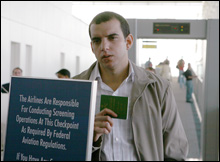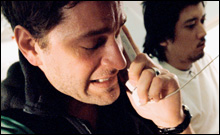 When audiences thrill next week to the disaster that unfolds in Poseidon, no one is going to complain or get too upset. Some might recognize that the terror and the relief they experience (if indeed they do; the movie might not compare with the 1972 trash-classic original, The Poseidon Adventure) tap into real-life fears of doom, or note that the sinking ship is a metaphor for our own endangered civilization. It’s just a movie, an escape, a safe outlet for what really bothers folks, the nagging dreads they can’t do anything about.
When audiences thrill next week to the disaster that unfolds in Poseidon, no one is going to complain or get too upset. Some might recognize that the terror and the relief they experience (if indeed they do; the movie might not compare with the 1972 trash-classic original, The Poseidon Adventure) tap into real-life fears of doom, or note that the sinking ship is a metaphor for our own endangered civilization. It’s just a movie, an escape, a safe outlet for what really bothers folks, the nagging dreads they can’t do anything about.
Had United 93 been just such a Hollywood pipe dream and not based on a national trauma, it might have worked the same way. (It would probably need a more upbeat ending.) As it is, it treads a fine line between catharsis and exploitation, between the manipulation of an agenda and the illusion of objectivity. Paul Greengrass, who had expertly handled a similarly sensitive event in Bloody Sunday (2002), shows even more skill in his treatment of this far more convulsive subject. I wonder how much better a film he might have made had he not been so cautious, but as it is, he does the subject justice.
As in Sunday, Greengrass aspires to the immediacy of real time and a cinéma-vérité point of view to re-create confusion, horror, and resolve. The camera participates in the ordeal like one more passenger on the doomed flight, with other victims introduced peripherally, their identities established by snatches of conversation and briefly glimpsed crotchets of behavior. When the hijackers strike, the violence assaults the lens and shatters the narrative into jagged cuts. No one watching can escape the feeling of helplessness, despair, doom.
Until, that is, 93’s passengers and crew themselves regroup, and the film does as well, spinning out a plausible, speculative version of how they might have turned on the hijackers, nearly wresting back control of the plane and finally causing it to crash before it could reach its target, the US Capitol. This final act satisfies the need for vindication that 9/11 has instilled in everyone. But it also satisfies another, perhaps deeper need — the need to know. How things happened, how things were done.
 Or not done. Greengrass does not restrict himself to the hijacked jet. With chilling verisimilitude (many of those involved in the events play themselves) he parallels 93’s fate with the slow dawning of awareness among the air-traffic controllers, FAA officials, and Air Force commanders on the ground. Blips disappear on a radar screen, strange things are heard on a radio, and controllers look out the window in Newark to witness the unthinkable image that shaped the world we now must deal with today.
Or not done. Greengrass does not restrict himself to the hijacked jet. With chilling verisimilitude (many of those involved in the events play themselves) he parallels 93’s fate with the slow dawning of awareness among the air-traffic controllers, FAA officials, and Air Force commanders on the ground. Blips disappear on a radar screen, strange things are heard on a radio, and controllers look out the window in Newark to witness the unthinkable image that shaped the world we now must deal with today.
ADVERTISEMENT
 |
At times, it’s almost too much to bear. The helplessness more than anything else, the frustration of hearing questions like “Where is the president?” repeated again and again. Those entrusted with the protection of American citizens failed. The citizens themselves did not: as far as we know, the only successful anti-terrorist mission undertaken by this country was the action of the crew and passengers of United 93. If only to honor their heroism, and inspire our own, this film must be seen.